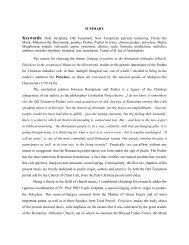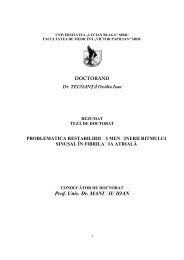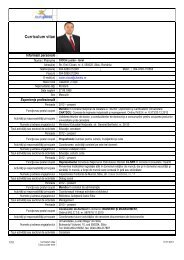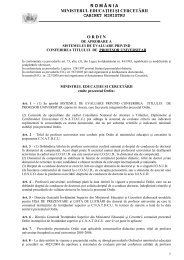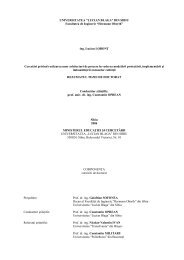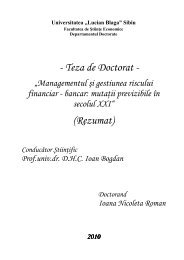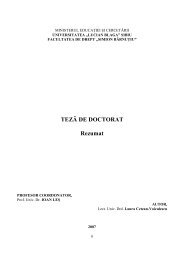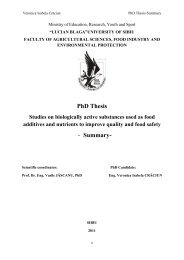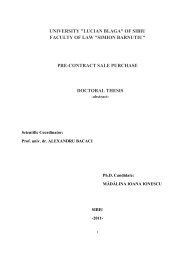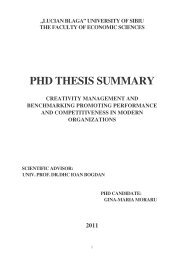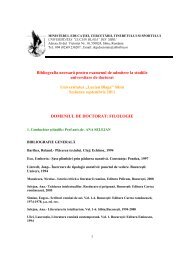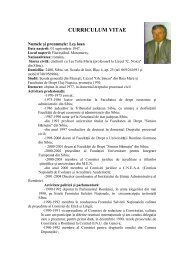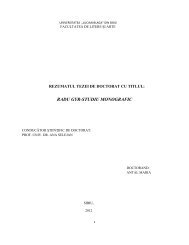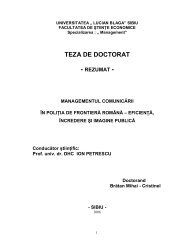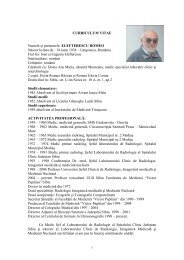politics in Romania revealed the audacity of the messages that the author sent in thesubtext, even in Păsările, Apa or Iluminări, which were often labelled as opportunisticin Romania.Secondly, the choice of Ivasiuc’s prose fiction was supported by the fact thatthe author was recognized as a pioneer in restoring the connection with theintrospective fiction represented by Camil Petrescu, Anton Holban, HortensiaPapadat-Bengescu, Max Blecher, as well as a supporter of synchronizing Romanianliterature with the European and the American modernism of writers such as JamesJoyce, Virginia Woolf or William Faulkner, primarily known as innovators at thenarrative level. In addition, Ivasiuc’s fiction offers a diversity of creative forms,literary critics often speaking of a transition from reflexive fiction to the traditionaland then parabolic ones, which, in our view, allows for a clear comparison with otherwriters of the generation and for a comparative analysis of the meanings thesenarrative techniques entail.As far as Ivasiuc’s life and work are concerned, the present thesis relied oninformation provided by literary historians (Nicolae Manolescu, Eugen Negrici,Eugen Simion), books belonging to literary critics dealing with Ivasiuc’s work(Cristian Moraru, Ion Bogdan Lefter, Ion Vitner, Sanda Cordoş), books of memoirsby close friends (Florin Constantin Pavlovici, Nicolae Caran<strong>din</strong>o, Nicolae Manolescu,Fănuş Neagu, Tita Chiper-Ivasiuc), and interviews with and essays by the authorhimself.The first chapter of the thesis, The 1960s in Romanian literature. ThePortrait of a Generation offers a panoramic view of the historical, social, economicand cultural context of the 1960s, outlining the requirements of the authorities as faras literary production was concerned, the coercive means which these ones used, butalso the efforts of young writers at the time to produce a different kind of literature, torevive authentic literary creation. The first subchapter focuses on defining the conceptof generation as discussed by critics, literary historians, philosophers and sociologistsin the inter-war period or in contemporary times, and on introducing the characteristicfeatures of each generation of writers. Expan<strong>din</strong>g on these features and introducingthe periodisations proposed by literary critics and historians, this subchapter showsthat the 60s are marked by a group movement, by the affirmation of a new literarygeneration made up of writers and literary critics. Also, the usefulness of the conceptin the analysis of the post-war Romanian literature is underlined.6
The following five subchapers deal with the analysis of the essential featuresof the distinct periods of time which marked the formation of the 60s writers (thepost-war transition period, the period dominated by socialist realism, the liberalizationperiod after 1965, the re-dogmatisation period and, finally, the period after 1989),with an emphasis, in the case of the pre-1989 period, on the pressures coming fromcultural politics, on the party’s political fluctuations and on the openings that thewriters took advantage of. In the context of the ideological dogmatism of socialistrealism, of the inauthentic fiction which abdicated the elementary criteria of artisticcreation, young writers such as Fănuş Neagu, D.R. Popescu, Nicolae Velea, IonBăieşu, Teodor Mazilu, Vasile Rebreanu, Nicuţă Tănase, Radu Cosaşu managed toescape the conformism which dominated the dawn of the 1960s and, giving up clichésand festivism, silently brought forward real social and moral issues, enlarging the areaof realism through a discourse founded on myth and symbol, through rediscoveringthe individual’s inner self, through new narrative forms, satire and humour.The prose fiction at the beginning of the 1960s represents the preamble to amuch more important movement that occurred in Romanian literature after 1964. Theconcessions and openings initiated by Gheorghiu-Dej that year also characterized thefirst years of Ceausescu’s leadership, elected as prime-secretary of the CommunistParty in July 1965. After the 9 th Congress of the Party in July 1965, the generalatmosphere was one of political, ideological and economic opening and relaxation.During this period, liberalization is to be felt in the literary area as well. NicolaeCeauşescu’s speech at the 9 th Congress of the Communist Party outlined a newattitude of the party towards literature. Art creators were encouraged to preservesocialist themes, to serve “the grand goal of forging a happier life for the people”, butat the same time it stressed the importance of “the diversity of styles” and of “theartists’ individuality”, which contradicted the uniformity of the socialist realismtheses. The rehabilitation of some key-figures of the inter-war literature, the enlargingof the theatrical and cinematographic repertoire, the explosion of translations fromworld literature, the multitude of literary and cultural reviews which outlined theaesthetic element (Gazeta literară, România literară, Luceafărul, Steaua, Tribuna,Iaşul literar, Cronica, Viaţa românească, Ramuri, Secolul 20, Flacăra), all fuelled thewriters’ hopes and courage.In the second half of the 1960s, along with writers who had initiated thedesideologization of literature and who were now perfecting their techniques, new7
- Page 2 and 3: TABLE OF CONTENTSINTRODUCTION .....
- Page 4 and 5: SUMMARYThe doctoral thesis Narrativ
- Page 8 and 9: names began to emerge: Nicolae Breb
- Page 10 and 11: was awarded (two prizes of the Writ
- Page 12 and 13: with the text through the opinions
- Page 14 and 15: integrate elements involving both n
- Page 16 and 17: omniscience, from the discourse cha
- Page 18 and 19: “zero degree narratee”, any dev
- Page 20 and 21: the two main directions existing in
- Page 22 and 23: portrayal, but one based on signifi
- Page 24 and 25: What the characters discover after
- Page 26 and 27: The analysis on the character also
- Page 28 and 29: internal, the focalized can be perc
- Page 30 and 31: Koppe 37 , that the relation focali
- Page 32 and 33: epresented by a proliferation of an
- Page 34 and 35: BIBLIOGRAPHYI. OPERA LUI ALEXANDRU
- Page 36 and 37: 6. Popescu-Neveanu, Paul, Dicţiona
- Page 39 and 40: 45. Neagu, Fănuş, Cartea cu priet
- Page 41 and 42: 21. Călinescu, George, Scriitori s
- Page 43 and 44: 60. Iser, Wolfgang, The Implied Rea
- Page 45 and 46: 98. Pârvulescu, Ioana, Prejudecă
- Page 47 and 48: 140. Selejan, Ana, Literatura româ
- Page 49 and 50: 14. Dimisianu, Gabriel, USR sau SSR
- Page 51 and 52: 3. Blandiana, Ana, Scriitorul şi P
- Page 53 and 54: 25. Pier, John, La narratologie all



